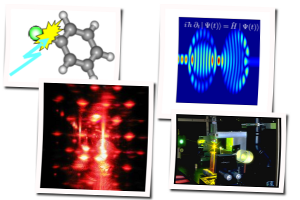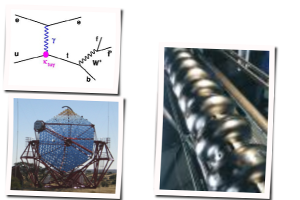Department of physics
Research
Research Areas
Laser Physics and Photon Science
 |
As a research location, Hamburg boasts a globally unique constellation of leading expertise in the following closely interrelated fields: laser physics, quantum optics, ultrafast phenomena, X-ray physics, and atomic and molecular physics. Experimental and theoretical research interests in the Department of Physics of the University of Hamburg include the generation and control of ultracold quantum gases; the production and characterization of ultrashort bursts of light; the manipulation and observation of the dynamics of electrons and atoms in molecules and solids; and the development of new techniques for determining the structure of matter. Research Groups |
Solid-state Physics and Nanoscience
 |
The fascination of quantum physics in solids and nanostructures, as well as in biological systems is at the center of Hamburg solid-state physics. The research ranges from answering fundamental questions on the origin of magnetism from the interaction of many atoms to the development of functional nanomaterials for energy transport and storage. The scientists develop highly sensitive measuring devices such as the spin-resolved scanning probe microscope and advanced theoretical methods to describe correlated quantum systems in non-equilibrium. The coupling of biological cells to nanostructured device opens new avenues for the development of medical applications. Research Groups |
Particle Physics and Astrophysics
 |
Hamburg provides a unique environment for interdisciplinary research at the interfaces between particle physics with astrophysics and cosmology. Activities include the study of the fundamental properties of matter at accelerator experiments such as the Large Hadron Collider, the use of the high-energy Universe as a natural laboratory to study the origin of matter as well as research on key questions in astrophysics. Theoretical, experimental and observational research are highly intertwined. Scientists at Hamburg construct new detectors and telescopes, hunt for new particles in laboratories, observe the local and far Universe from radio waves to highest energy cosmic rays, model the building blocks of our Universe on supercomputers and perform fundamental studies in string theory and mathematical physics. Research Groups |
Cooperative Research Projects
Graduiertenkollegs
- GRK 1286: Functional Metal-Semiconductor Hybrid Systems
- GRK 1351: Extrasolar Planets and their Host Stars
- GRK 1355: Physics with new advanced coherent radiation sources
- GRK 1670: Mathematics Inspired by String Theory and QFT
Sonderforschungsbereiche
- SFB 668: Magnetism from the single atom to the nanostructure
- SFB 676: Particle, Strings and the Early Universe: the Structure of Matter and Space-Time
- SFB 925: Light induced dynamics and control of correlated quantum systems
- SFB 986: Tailor-Made Multi-Scale Material Systems - M3
Bundesexzellenzinitiative
- EXC 1074: Hamburger Zentrum für ultraschnelle Beobachtung (CUI): Struktur, Dynamik und Kontrolle von Materie auf atomarer Skala
- EXC 2121: Quantum Universe
- EXC 2056: Advanced Imaging of Matter: Structure, Dynamics and Control on the Atomic Scale